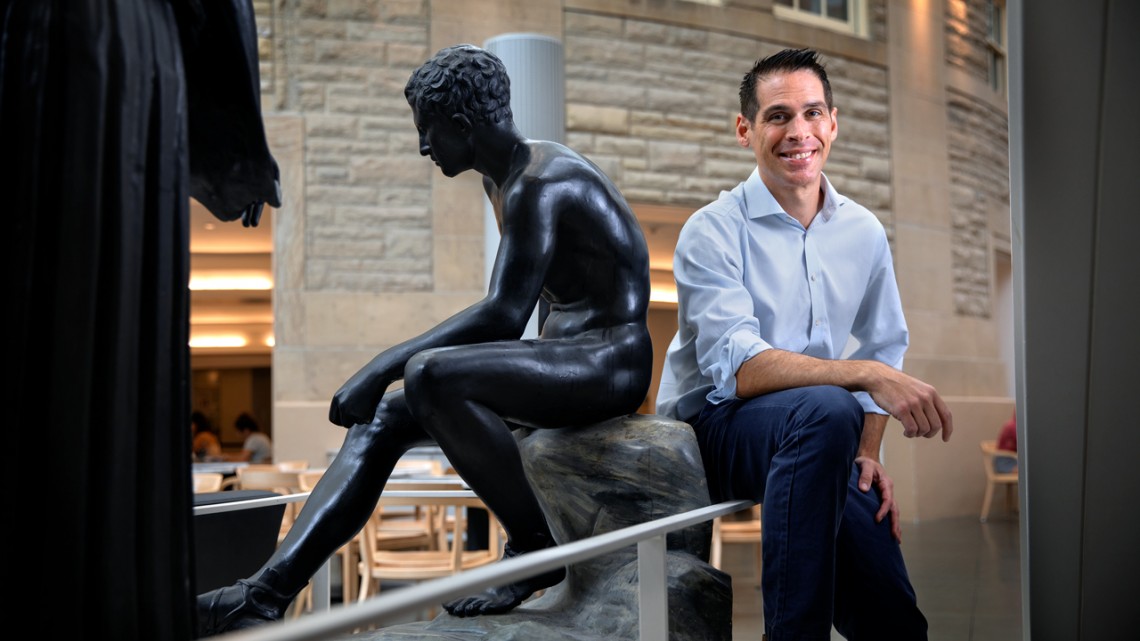
Michael Fontaine, classics professor and also Cornell's associate vice provost for undergraduate education.
Action figures in classical literature
By Michael Fontaine
There’s a great story from the ancient world. As Cicero tells it, it goes like this:
When Hercules was approaching maturity, which is the time selected by nature for choosing the road in life one must travel, he sought out an isolated place. Sitting there for a long time, he could not decide which path was better for him. For he could see two paths, one marked PLEASURE and another marked VIRTUE.
Okay, dear reader, what’ll it be, virtue or pleasure? What does “virtue” even mean – or, for that matter, “pleasure”? What if I brought you out to the Herakles statue near the Statler, gave you a bottle of spray chalk and $100, and told you and a group of your classmates to illustrate each path? What objects would you use, and how would you get everyone to agree?
When I teach this myth in class, students eventually discover they can use the very same objects to illustrate both words if they pick different sizes or quantities: dumbbells or doughnuts, chocolates or carrots, duties or diets. I could just tell them that. But in my experience, the point about moderation really sinks in when you figure it out for yourself.
Teaching and learning have changed dramatically in the last 20 years, from passive to active, and it’s clearly for the better. As a professor of classics, I’m eager to embrace active learning. And as Cornell’s associate vice provost for undergraduate education, I’m delighted we’re investing in it.
In the not-so-old days, the professor was a sage on a stage delivering a sermon, while students quietly listened and learned. Sometimes it worked. Today, data show us that more students learn more by taking an active role in the classroom: more talking, more groups, more games, more quizzing each other – in short, more activity.
This is another classic idea we’re rediscovering. In ancient Rome, the master teacher Quintilian says that games, quizzing and positive reinforcement are the way to go:
Studies must be made an amusement: Students must be questioned and praised and complimented when they get it right.
Of course, this means a lot of work for me. I have to plan. I have to anticipate and arrest your interest with dilemmas and puzzles, and get you and your classmates talking. When I lecture, I now want to interrupt myself periodically with questions that will give everyone in the room – not just the eager few – a voice and time to work through their thoughts.
It also means finding the right technology. Never has it been easier to enrich teaching and assignments with multimedia – images, music, film clips, hyperlinks – but lately I’ve done even better than that. Thanks to a generous donation by a Cornell alumnus, I now pass out chocolate replicas of ancient Greek and Roman coins to show students in my courses what ancient coins looked like. The rule is, first we discuss them, then we eat them. Smiles are guaranteed – and so is recall on the final exam.
I’ve also found iClickers amazingly effective in humanities courses. Why? Because they give a voice to everyone, especially shy students. (It’s scary to answer a question in front of lots of classmates!) Even better, clickers anonymize answers to sensitive questions of morality or politics that students might not want to own up to publicly. Clickers let us depersonalize tough topics instead of ignoring them.
Finally, infrastructure matters. In smaller classrooms, group discussions work best when students can move tables or chairs around. In larger ones, it’s easier for students to turn to their neighbors when they have a little room to move. In my associate vice provost role, I have the responsibility to develop classroom infrastructure appropriately. In fact, we’re renovating Baker 200 auditorium right now, and the best practices of active learning have informed our decisions about architecture at every step.
Oh, and by the way, Hercules chose the path of virtue.
Michael Fontaine is a professor of classics and Cornell’s associate vice provost for undergraduate education.
Media Contact
Get Cornell news delivered right to your inbox.
Subscribe

